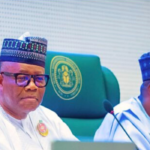The Socio-Economic Rights and Accountability Project (SERAP) has filed a lawsuit against Nigeria’s Minister of Finance, Budget and National Planning, Mrs Zainab Ahmed, for failing to disclose information and release specific documents on the total amount of money paid to contractors from the $460 million loan obtained in 2010 from China to fund the allegedly failed Abuja Closed-Circuit Television (CCTV) project.
The suit also seeks to compel the minister to name the contractors involved in the Abuja CCTV project as well as seeks explanation on why the government has continued to re-pay the loan.
In the suit filed last week at the Federal High Court, Abuja, SERAP is seeking an order for leave to apply for judicial review and an order of mandamus to direct and/or compel the Minister of Finance to disclose the details of local companies and Chinese contractors that have received funds from the $460 million loan for the finance of the failed Abuja CCTV project as well as details of the status of implementation of the project.
SERAP is also seeking an order of mandamus to direct and compel the Minister of Finance to disclose whether the sum of N1.5 billion paid in 2010 for the failed project meant to construct the headquarters of the Code of Conduct Bureau (CCB) was part of another loan obtained from China.
It also seeks to clarify further whether the sum of N1.5 billion mobilisation fee for the construction of the Headquarters of the CCB in Abuja was part of another loan from China.
The suit followed SERAP’s Freedom of Information (FoI) request dated 25 October 2019 to Mrs Ahmed, expressing concern that Nigerians are being made to pay for the Chinese loans for failed and abandoned projects, and for which they have not benefited in any way.
The suit filed on behalf of SERAP by its lawyers Kolawole Oluwadare, Opeyemi Owolabi and Ms Atinuke Adejuyigbe, read in part: “Transparency in the spending of Chinese loans is good for everyone, as this would help to increase the effectiveness, legitimacy, and contribution of the loans to the development of public goods and services, and the general public interests.”
“Democracy cannot flourish if governments operate in secrecy. The citizens are entitled to know how the commonwealth is being utilized, managed and administered in a democratic setting,” it added.

 Join Daily Trust WhatsApp Community For Quick Access To News and Happenings Around You.
Join Daily Trust WhatsApp Community For Quick Access To News and Happenings Around You.


